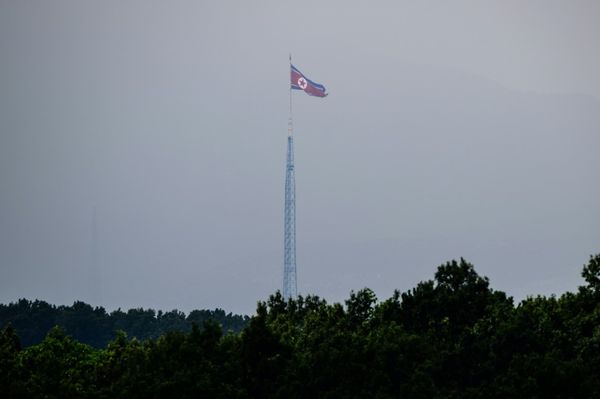America still had the naïve ability to be shocked back on Nov. 16, 1973, when a rambling then-President Richard Nixon stood up before 400 Associated Press journalists. Wallowing in the Watergate scandal, the 37th president joked morbidly about his plane crashing before he could be impeached, then uttered these famous words: "'People have got to know whether or not their president is a crook. Well, I am not a crook."
Quitting before he could be impeached and pardoned by successor Gerald Ford, Nixon never had his day in court. Some 48 years later, a Watergate-style investigation and accelerating probes in both New York and Atlanta have the nation now asking whether their ex-president is a crook. And with each passing day, new revelations about Donald Trump's involvement in Jan. 6 coup plotting or other misdeeds are raising the stakes.
In 2022, the real question for a frazzled, exhausted America is becoming less whether the 45th president was a crook, but more what are we going to do about it?
This may sound like a weird thing to say about a man who's been through a handful of business bankruptcies and divorces, two presidential impeachments and finally getting unceremoniously booted from the Oval Office after just one term, but last week might have been the worst week of Trump's 75-plus years on Earth. Consider:
— Remember the possible "smoking gun" in the House Jan. 6 investigation that I wrote about a couple of weeks ago? Now, thanks to an 8-1 Supreme Court ruling requiring the surrender of key documents, we've seen the draft presidential order in question — and you can smell the gunpowder. On Dec. 16, 2020 — or two days after electors in state capitols teed up President Joe Biden's victory — the draft circulating in Trump's White House called for declaring a national emergency in which U.S. troops would be deployed in seizing ballot boxes, putting the 2020 election in the realm of a corrupt banana republic.
— The Washington Post and CNN reported that Trump's personal attorney, former New York Mayor Rudy Giuliani, was a key architect and an organizer of the scheme in which Republicans in five key battleground states won by Biden sent forms to the National Archives and elsewhere falsely claiming they were the "duly elected" electors, for Trump. The tallies were part of a scheme by Trump advisers for Vice President Mike Pence or Congress to somehow invalidate Biden's victory at the Jan. 6 certification.
— From Georgia came news that the district attorney for Fulton County, home to Atlanta, has asked for a special grand jury that would investigate "possible criminal disruptions" in the 2020 presidential election in the Peach State. That would surely include the notorious tape recording of Trump, one of the planet's most powerful people, hectoring GOP functionaries to find him the 11,780 votes to undo Biden's surprising victory in that state. (On Monday, judges on Fulton County’s Superior Court granted the request.)
— A fresh report from here in Pennsylvania captured the ongoing efforts — again, of dubious legality — to keep alive Trump's "big lie" that the 2020 election was stolen from him. An investigation by The Guardian ties allies of Trump former national security adviser Mike Flynn — also a key pusher of the plan for POTUS45 to declare a national emergency — to unsuccessful efforts in the Keystone State to dig up dirt on Rep. Mike Fitzpatrick and Sen. Pat Toomey and force them to back an audit of the 2020 vote count here.
— Last week also brought a reminder of one reason why Trump was so eager to cling to the presidency — to beat down other probes of his alleged wrongdoing. New York Attorney General Letitia James released a stunning overview of the Trump Organization's pattern of possible fraud that grossly overinflated the value of multiple properties owned by the ex-president's firm. James wants to question Trump and his children Donald Jr. and Ivanka in a civil case that appears to overlap with a criminal investigation in Manhattan.
Wow, and you thought you were having a bad week because you had to pay $9 for a Chipotle burrito! Seriously, the big picture for Trump right now is this: The House January 6 committee — along with overlapping probes like the one in Georgia and continued investigative reporting — is closing the circle on a criminal conspiracy. It was hatched the moment Biden was declared the election winner — with roots planted deeply in the Trump White House — in an effort to overturn the result, right up to the unlawful disruption of Congress and its vote certification on Jan. 6.
While Trump ultimately would not (or more likely could not) declare a national emergency, other arguably unlawful acts — including attempted election tampering in Georgia and the submission of fraudulent electoral slates — that are tied to the wider conspiracy did occur. When these other efforts failed, the plotters — with a verbal push by the then-president, monitored from "a war room" at the Willard Hotel — encouraged and then failed to call off the civilian violence in Capitol Hill that left five people dead or dying, and injured scores of cops. What's more — much as happened with Nixon during Watergate — Trump's imploding moral position around the Jan. 6 coup is causing a reexamination of his other actions, including the long-dubious practices of his multimillion-dollar business empire, in a harsher light as well.
As I noted in a recent column, nationally televised hearings — with probably some in prime time — by the House committee this spring offer the potential to lay out Trump's alleged crimes in a compelling, understandable storyline, and thus turn public opinion more harshly against the 45th president. That, too, loudly echoes Watergate, but this is also where the plot diverges.
There's a huge, obvious difference: Nixon was the incumbent president in 1973-74, and the Watergate investigation sullied his reputation at the same time that other problems — gas lines and rising prices at the pump, the loss of U.S. prestige at the end of the Vietnam War — dragged down a sitting POTUS. In 2022, Trump's crimes will be exposed against a backdrop of declining — at least for now — popularity of his Democratic replacement in Biden. New evidence of Trump high crimes and misdemeanors will be competing against a surely loud argument that probing an ex-president is just a witch hunt to distract from inflation, or COVID-19, or other Biden woes.
And also unlike the early 1970s, when Watergate sparked unrelentingly negative coverage in the newspapers and on the three TV networks that were the only places for folks to get their news, Trump's sins will be whitewashed by an army of megaphones from Fox News' Tucker Carlson to talk radio to your uncle on Facebook.
In a world of reality-based critical thinking, one looks at the criminal conspiracy roadmap teed up by the House committee and wonders how Attorney General Merrick Garland's Justice Department could fail to make a felony case against Trump and his inner circle. But in the bitterly divided and arguably broken America that we actually have, Garland — whose timidity so far has failed to match the fierce urgency of now — could be easily cowed by politics to avoid the messiness of criminally charging a U.S. president for the first time.
But while I'm quite worried about the Garland factor, I'm even more worried by this: In a year when the fate of U.S. democracy is at least competing with the price of burritos and mask mandates in public schools for the attention of voters, there is the very real possibility of learning in prime time that our president was a crook — and then doing nothing. And that feels like it could be the actual fatal blow for our American Experiment.
Let's face it, either way it will not be pretty, nor will it go down as smoothly as Watergate, with pundits crowing that "the system worked." If Trump is indicted for his crimes, it's not a wild fantasy to imagine a Jan. 6-level response, especially with the added gasoline of racism against the prosecutors in Fulton County, Manhattan and New York state who all happen to be Black Democrats. If, for example, that grand jury in Atlanta does charge Trump, it's not hard to think that caravans of GOP voters from the red-clay foothills of Georgia or Alabama will pour into the cosmopolitan city to block his arraignment. It's possible to see the blueprints of a true civil war.
And yet the much greater fear is that — after an ex-president's efforts to block the peaceful transfer of power and stage the first real coup in American history is laid out in chapter and verse — a depressed, divided and utterly demoralized nation elects to do absolutely nothing about it. That, too exhausted to make the hard choices to save our democracy, we will simply wait for the comet to strike.
The late Rev. Martin Luther King Jr., whom we paused ever so briefly to honor this month, said, "Our lives begin to end the day we become silent about things that matter." I can't help but wonder if America will begin to end if we choose silence about the criminality of Donald Trump.
____







